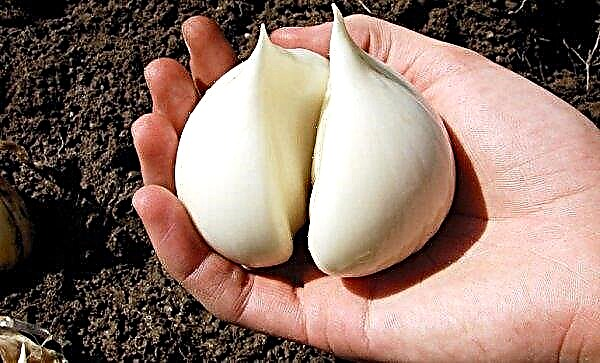Women during pregnancy are especially attentive to their diet, because the health of both - the future mother and her baby, depends on its quality. Experts recommend pregnant women to actively include vegetables and fruits, which are natural sources of valuable vitamins and minerals, in the diet. One of the common components of the daily diet, especially in the winter season, is sauerkraut. The article will discuss whether it is possible to have such a product for expectant mothers, and what are the features of its use.
The chemical composition of sauerkraut
Cabbage in any form refers to low-calorie foods, which has gained popularity among people who monitor their weight. Calorie vegetable in fermented form is only 19 kcal per 100 g.
The main part of the product - about 91% - is water. The remaining components are dietary fiber, carbohydrates, protein and a small amount of fat. The vegetable contains B vitamins (B1, B2, B5, B6, B9), A, C, E, K, H and PP.
 As for the mineral composition, it is characterized by a high content of calcium, as well as volatile and enzymes that improve metabolism
As for the mineral composition, it is characterized by a high content of calcium, as well as volatile and enzymes that improve metabolism
The product also contains the following minerals:
- potassium;
- calcium;
- magnesium;
- sodium;
- phosphorus;
- iron;
- sulfur;
- manganese;
- copper;
- selenium;
- zinc.
The process of fermenting cabbage allows you to save in it useful substances in full.Important! A low level of oxalates, combined with a high concentration of vitamin B, contributes to the easy absorption of cabbage by the human body.
- Regular use of the product:
- improves digestion, helps fight constipation;
- destroys pathogenic bacteria in the intestinal flora;
- prevents the development of anemia, improves the functioning of the heart and blood vessels;
- enhances immunity and helps to resist infections and colds;
- significantly improves the condition of the skin, hair and nails;
- normalizes well-being and strengthens a dream.
 With moderate consumption, the product does not have harmful properties for the human body. An exception may be individual intolerance and allergic reactions.
With moderate consumption, the product does not have harmful properties for the human body. An exception may be individual intolerance and allergic reactions.
Is it possible to eat sauerkraut during pregnancy?
Sauerkraut is one of the vegetables recommended for use by pregnant women in the absence of individual contraindications. If the attending physician does not prohibit, then this product can and should be included in your diet. The main thing is to use only high-quality cabbage, better prepared with your own hands, and not get too carried away with it because of the rather high content of salt or vinegar.
Many women say that sauerkraut helps to cope with a common problem of pregnant women - flatulence. In addition, the vegetable becomes an excellent source of valuable vitamins and minerals, especially necessary during the period of bearing a child. Sour cabbage will support the body's defenses and help protect against viral infections.

In the early stages
In the first trimester of pregnancy, when the main organs and systems of the fetus are laid, the intake of folic acid into the body is important. Sauerkraut has a high concentration of this vitamin. Besides, a significant content of iron and calcium will help the formation of healthy tissues and bone system of the baby.
This vegetable will become a good additional source of valuable vitamins and minerals, help to avoid infection, improve metabolism and strengthen the nervous system.
Important! Since a woman’s diet during pregnancy affects the health of both mother and baby, it’s worth consulting with your doctor first. Including the use of any products as traditional medicine.
Early pregnancy is often accompanied by severe toxicosis. The use of acid cabbage or its brine after bouts of nausea will help reduce its manifestations.
In the II trimester
Most pregnant women in the second trimester disappear manifestations of toxicosis, and their health returns to normal. At the same time, a growing child begins to put pressure on internal organs, which can lead to swelling. Cabbage with its high potassium content will help normalize kidney function and remove excess water from the body.

However, for this purpose it is better to consume a fresh or stewed vegetable that does not contain salt. In turn, fermented product satisfies hunger and prevents the gain of excess weight. Brine is considered a good prevention of hemorrhoidswhich often bothers pregnant women during this period.
If the expectant mother periodically continues to "stir up", then a small amount of brine will help to cope with the problem. It should only be taken into account that its use on an empty stomach can cause negative manifestations from the gastrointestinal tract.
Did you know? Sauerkraut was one of the obligatory dishes in the diet of the great sailors of the time of the discovery of new continents. It was this product that saved sailors from vitamin deficiency and scurvy during long sea voyages.
In late terms
At this time, the baby continues to grow, develop and require the intake of proteins, fats and carbohydrates. At this time, many expectant mothers begin to overeat and gain extra weight. Cabbage, as a very useful and low-calorie product, fits perfectly into the diet of a pregnant woman, without bringing in extra calories. Also relieve swellingthat many expectant mothers complain about.
In the third trimester, pressure on the internal organs of a woman increases, which can cause constipation. In this case eating cabbage will help to improve bowel function. And vitamin K will contribute to the work of the hematopoietic system, including good blood coagulation, which is especially important in the prenatal period. In addition, salted vegetable is an effective means of removing toxins from the body, which is also relevant during this period.

How to use the product?
During pregnancy, you should adhere to such rules for the use of sauerkraut:
- Limit the amount of product, as it is quite salty.
- Use as an appetizer to the main dish, additives to meat or other vegetables.
- Excellent to use in combination with carrots or fresh cucumber.
- It can be used to prepare light, tasty and aromatic cabbage soup.
- Do not eat at night, especially in large quantities, so as not to cause swelling.
- Use the brine in small portions and not on an empty stomach.
- Stop taking if any negative effects on the body occur.
Contraindications
In addition to individual intolerance and a tendency to allergies, caution should be used with acid cabbage for diseases of the gastrointestinal tract, pancreas and liver. In such cases, the product should be introduced into the diet only after consulting a doctor and strictly in the authorized quantity. You can not abuse it with diseases of the urinary system, since a high concentration of salt can cause swelling.

The original quality of the product is also important. When buying ready-made cabbage, you should pay attention so that it has a light shade and is completely covered with brine. Cabbage should have a pleasant smell and crunch, but the gray color and mucous structure are signs of a poor-quality product.
Did you know? The name of this vegetable is associated with its peculiar form. So, the ancient Greek and Roman word “cabbage” sounds like “kaputum”, which means “head”.
Storage Features
Cabbage can not be fermented and stored in plastic or aluminum containers, since lactic acid that can oxidize materials is released during the fermentation of the vegetable.
Storage rules for salted vegetables:
- Store in a cool place - basement, cellar or refrigerator.
- In the winter season, storage on a glazed balcony is possible.
- Keep in a container with brine, preferably in a glass jar.
- Shelf life can be increased by adding cranberries or 1-2 tbsp. l Sahara.
- Mold should be removed from the product, after which you can add a little mustard powder as an antiseptic.
- If necessary, store in the freezer and eat immediately after thawing.

Moderate consumption of sauerkraut is of great benefit to both children and adults. The product saturates the body of a pregnant woman with vitamins and minerals, helps to diversify the diet and get rid of many health problems or prevent them.












